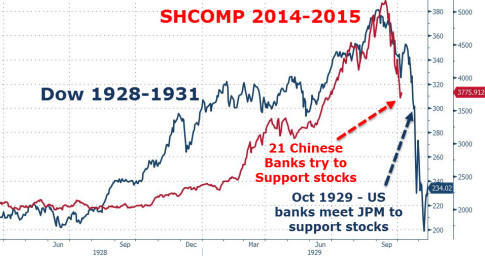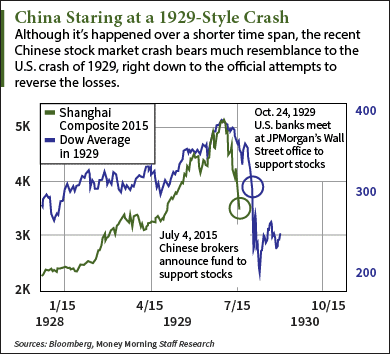– Similarities Between China’s Stock Market Crash and 1929 Are Eerie (David Stockman’S Contra Corner, July 10, 2015):
By David Zeiler at Money Morning
For students of history, the China stock market crash looks eerily familiar.
It’s playing out much like the Wall Street stock market crash of 1929.
In case you’ve been distracted by such things as the Greek debt crisis and a bizarre glitch that shut down the New York Stock Exchange for more than three hours Wednesday, the Chinese stock market has been in a free fall lately.
Although it rebounded 5.8% today (Thursday) thanks to more government intervention, the Shanghai Composite Index has shed 29% over the past month.
An equivalent loss for theDow Jones Industrial Average would be a drop of more than 5,100. Paper losses already exceed $3.25 trillion.
This follows a dramatic run-up of 150% in the 12 months leading up to mid-June.
That’s disturbing enough, given how interdependent the global economy is today. But the similarities of the China stock market crash to the Crash of 1929 make it particularly troubling.
Both have prominently featured failed interventions.
Back in 1929, it was the big bankers of Wall Street that tried to stop the bleeding. The top names of the day – Morgan Bank, Chase National Bank, and National City Bank – pooled their resources and tried to prop up the market by buying shares of blue-chip stocks such as United States Steel Corp. (NYSE: X).
But the strategy could not overcome the wave of selling, which eventually dropped the DJIA 89% from its peak.
In China, the government has done just about everything it can think of to halt the Chinese stock market crash. The government has:
- Loaned $42 billion to 21 brokerage firms to buy stock
- Announced a $40 billion economic stimulus plan
- Allowed half the listed companies to stop trading of their shares
- Prohibited controlling shareholders and company board members from selling any shares for six months
- Put all IPOs on ice for now
- Instructed the People’s Bank of China to cut interest rates by 0.25%
- Announced a crackdown on short selling
These drastic measures have succeeded in only briefly reversing the China stock market crash.
And the reason why echoes yet another parallel with the 1929 crash…
The Real Cause of the China Stock Market Crash
One of the factors fueling the soaring stock market of the 1920s was an influx of new, financially unsophisticated investors who saw the rising numbers and saw an opportunity for quick and easy profits.
And that’s exactly what’s happened in China over the past year or so. Making matters worse is that these inexperienced Chinese investors tend to follow a herd mentality.
“Chinese individual investors are not primarily ‘value’ investors. Sky-high valuations don’t seem to faze them. They are primarily momentum investors who buy whatever is moving and sell whatever is falling,” financial expert John Mauldin wrote in his “Thoughts from the Frontline” e-letter last week.
And many of these investors were willing to borrow money – trade on margin — to enhance those profits.
“Almost every account that’s been opened in China comes with a margin agreement and access to margin. Margin lending is big business in China, as it is here in the U.S.,” saidMoney Morning Capital Wave Strategist Shah Gilani.
Margin trading was a big reason the 1929 crash was so severe. In margin trading, an investor borrows part of the money – in the late 1920s as much as 90% — to buy more stock.
That’s great when the stock rises, but becomes a major problem when it falls.
The Dangers of Margin Trading on the Stock Market
That’s because the lower stock price reduces the equity the investor has while the amount owed remains the same. Once a stock falls to a certain point, it triggers a “margin call.” The broker holding the loan asks for more cash to get the ratio back to where it’s supposed to be.
For many small investors, the only way to get that cash is to sell some of their shares. Of course, a lot of margin calls causes a lot of selling – and forces prices down even more. And that triggers still more selling.
That’s what happened in 1929, and that’s what’s happening now in the Chinese stock market. While government intervention can slow this kind of decline temporarily, it can’t stop it.
And in China we still have a long way to go.
“Until the margin buyers are gone, we don’t expect a stabilization or possibility for the market to start heading higher again,” Sean Yokota, head of Asia strategy for SEB Bank, told MarketWatch. “We are only one-third of the way through [deleveraging].”
The 1929 crash is remembered for a few hectic days in October of that year, but the market didn’t bottom out until July 8, 1932. The Dow Jones did not return to its 1929 high until Nov. 23, 1954.
That’s not to say China will suffer just as severe a collapse. But the Chinese stock market is on shaky ground right now.
Gilani believes U.S. investors need to keep a close watch on the situation in China. He’s against advising panic selling, but recommends investors have stop-loss orders in place in the event the China stock market crash inflicts collateral damage on the global markets.
“In spite of everything Chinese authorities and regulators are doing to shore up the stock market, there’s a better than 50% chance their efforts will fail and that a devastating crash could send global markets back into a 2008-era financial crisis,” Gilani warned.
The Bottom Line: The China stock market crash shares many troubling similarities with the devastating Crash of 1929. The Chinese stock market may get a bounce here and there, but the worst is yet to come. Investors need to take steps to protect themselves in case the China stock market crash starts to drag down U.S. stocks.


I think the Chinese crash is worse than 1929. In 1929, the US had a currency backed with gold & it was the largest lending nation in the world.
To my recollection, people were not allowed to put up their houses to buy stock as the Chinese have allowed. I don’t recall that the Chinese have any gold behind their currency…..? People were literally able to put up the deeds to their homes to buy stock……Margin purchases are at a record rate in China. They are in a triple bubble collapse…….I think it could be much worse.
My greatest concern is that the entire west has looked to China to pull us out of the economic malaise suffered since 2008…..Now, it is obvious they are in no position to save anyone’s economy. Corruption, and a dictatorship government that believes they can rule the expansion and contraction of economic development has shown their immature view of modern markets.
Our economic powers have all vested their MFG and R & D into China. Our economic infrastructure has been destroyed by outsourcing of all decent jobs to China, and other nations. How deeply will this affect the Euro and US markets?
So much for the wonders of globalization.
I think it will have an effect, and it won’t be easy for millions.
China used to loan the US money until it became clear after 2010 that nothing would be done to clean up our markets after causing the worst global economic crash in history.